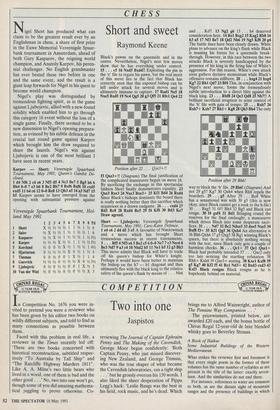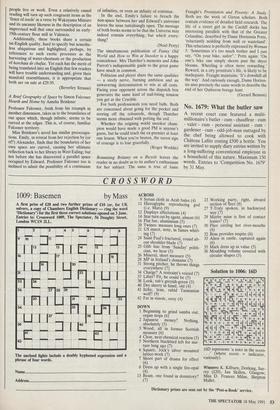COMPETITION
coVAS
12 YEAR OLD Ay SCOTCH WHISKY ``
?As REGV
12 YEAR OLD SCOTCH WHISKY
Two into one
Jaspistos
In Competition No. 1676 you were in- vited to pretend you were a reviewer who has been given by his editor two books on wildly different subjects, and told to find as many connections as possible between them.
Faced with this problem in real life, a reviewer in the Times recently led off: `These are two books concerned with historical reconstruction, subtitled respec- tively "To Australia by Tall Ship" and "The Ratcliffe Highway Murders 1811". Like A. A. Milne's two little bears who lived in a wood, one of them is bad and the other good . . .' No, two into one won't go, though some of you did amazing mathema- tical juggling to prove otherwise. Co- reviewing The Journal of Captain Ephraim Penny and The Making of the Cavendish, George Moor began confidently: 'Both Captain Penny, who just missed discover- ing New Zealand, and George Titmuss, who was the true shaper of what became the Cavendish laboratories, ran a tight ship . . .' but he grossly overran his 150 words. I also liked the sheer desperation of Pippa Legg's hack: 'Leslie Bangs was the best in his field, rock music, and he's dead. Which brings me to Alfred Wainwright, author of
The Pennine Way Companion . .
The prizewinners, printed below, are awarded £20 each, and the bonus bottle of Chivas Regal 12-year-old de luxe blended whisky goes to Beverley Strauss.
A Book of Haikus
Some Industrial Buildings of the Western Mediterranean What strikes the reviewer first and foremost is that every single poem in the former of these volumes has the same number of syllables as are present in the title of the latter: exactly seven- teen. And the similarities do not end there.
For instance, references to water are common to both, as are the distant sight of mountain ranges and the presence of buildings in which people live or work. Even a relatively casual reading will turn up such congruent items as the 'fence of reeds' in a verse by Wakayama Mimaro and its uncanny likeness in the description of an Improvised wall that once surrounded an early- 19th-century flour mill in Valencia.
Additionally, these books share a certain un-English quality, hard to specify but nonethe- less ubiquitous and highlighted, perhaps, by references to such exotic processes as the harvesting of water-chestnuts or the production of horchata de chufax. Yet each has the merit of being translated into an English that few readers will have trouble understanding and, given their manifold resemblances, it is appropriate that both are on sale at £29.95.
(Beverley Strauss)
A Brief Geography of Space by Simon Falconer Hearth and Home by Amelia Brinkner
Professor Falconer, fresh from his triumph in another dimension, takes us to the boundaries of our space which, though infinite, seems to be curved at the edges. This is, of course, familiar Falconer territory.
Miss Brinkner's novel has similar preoccupa- tions. Emily, in retreat from her rejection by (or of?) Alexander, finds that the boundaries of her own space are curved, causing her ultimate reflection back to her library in West Ealing; but not before she has discovered a parallel space occupied by Edward. Professor Falconer too is inclined to admit the possibility of a continuum of infinities, or even an infinity of continua.
In the end, Emily's failure to breach the non-space between her and Edward's universes leaves the issue tantalisingly open. The message of both books seems to be that the Universe may indeed contain everything; but which every- thing?
(Noel Petty) The simultaneous publication of Funny Old World and How to Win at Snooker is a happy coincidence. Mrs Thatcher's memoirs and John Parrott's indispensable guide to the great game have much in common.
Politician and player share the same qualities — a steely nerve, burning ambition and an unwavering determination to win at all costs. Facing your opponent across the dispatch box generates the same kind of nail-biting tension you get at the Crucible. For both professionals you need balls. Both are concerned about going for the pocket and scoring off the coloureds, though Thatcher seems more obsessed with potting the red.
Whether the reigning world snooker cham- pion would have made a good PM is anyone's guess, but he could teach the ex-premier at least one lesson. When you're beaten, the surest sign of courage is to lose gracefully. (Roger Woddis)
Botanising Brittany on a Bicycle leaves the reader in no doubt as to its author's enthusiasm for her subject. The same is true of Janie Fraught's Prostitution and Poverty: A Study. Both are the work of Girton scholars. Both contain evidence of detailed field research. The life of a street girl in the Cardiff docks has interesting parallels with that of the Greater Celandine, described by Dame Hortensia Potts, 'reluctantly nodding from wall or wasteland'. This reluctance is perfectly expressed by Woman 5: 'Sometimes it's too much bother and I just say, "On your bike, sailor".' Potts again: 'On one's bike one simply shoots past the shyer blooms. Wheeling is often more rewarding.' Reward, in a city prostitute's life, is likely to be inadequate. Fraught maintains: 'It's downhill all the way'. And curiously enough, Dame Horten- sia uses precisely the same words to describe the end of her Quiberon borage hunt.
(Gerard Benson)



























































 Previous page
Previous page